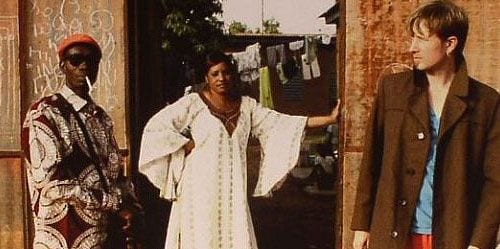
Zita Swoon Group, formerly know simply as Zita Swoon when they were considered a more “normal” rock band as opposed to their more amorphous current incarnation, is a collective based in Antwerp, Belgium that, on this album, specializes in a brand of indie rock that melds the typical guitar-bass-drums lineup with several instruments of a more traditional vein of African instruments; the balafon, an analogue of the xylophone, and a great number of small percussion instruments.
In addition to bandleader Stef Camil Carlens, there are prominently featured vocals from Awa Deme, a fantastic, emotive singer from Burkina Faso, as well as balafon player Mamadou Diabate Kibie. Much of the success from this album comes from the fact that this is not simply a pre-established band inviting a few backup musicians to play with them; rather, it is a full partnership, a true collaboration, right down to the lyrics being taken from and inspired by the poetry of both Deme and Kibie. The result is that the lyrics are sung in a variety of languages, from English, Dutch, French, and Dioula.
Although at first listen the sound seems to be a synthesis of “indie” rock and Mandingue music, it goes a little deeper than that, as the band prefers to push the boundaries of harmony, and form, as well as force themselves to move beyond their simple comfort zones, as is often the case with a collaboration between groups from such divergent cultural and musical backgrounds.
The collaborative spirit here is openly and explicitly addressed, as many of the songs deal with issues of social relevance such as relationships between rulers and people, and labor relations. It would be far too easy to suggest that these issues are relevant only in the impoverished nations of Africa, and that a group of white musicians is using their good fortune to shine a light on the plight of the “dark continent”. This is most definitely not the case, as the group makes it very clear that the such issues know no racial divide and are in fact universally relatable regardless of nation or creed. It is this acknowledgment of white struggle that truly enriches the collaboration and thankfully destroys any pretensions of this simply being another exposition of the disgusting “white savior complex”, where good intentions go beyond failing to do any real good and in fact only help to reinforce negative cultural stereotypes about the so-called “third world”, and the very people who are trying to help are kept at arm’s length (remember Live Aid?). And it is appropriate that a group from Belgium undertook such a task, as Belgium, much like the majority of Africa, was long subject to the predilections of larger European powers before it’s independence.
Due to the fact that the band has such a vast array of influences (undoubtedly coming from the disparate makeup of its members and it’s conscious approach of seeking out new and dynamic methods of composing and playing) there is a certain amount of difficulty in pinning down what exactly their “sound” is. Instead of being able to effectively nail down a small number of specific musical ideas that define them, they seem content with applying a broader pallet to a similarly broad spectrum of musical forms and structures, all with the same orchestration that includes things like the banjo and the pump organ. It’s a set of instruments that appears bizarre on paper but ultimately enriches the material.
Take for instance “A Sera, A Waara”, a strong track that starts out as a very familiar blues shuffle, even going so far as to quote a famous blues staple with the line “Baby please don’t go.” The joviality of the harmonization carries through until midway, when it starts transforming and flowing into darker waters; the gentle stream reaches a more frantic river and the majors become minors, the plaintive cries become more desperate and ragged until eventually words fail to suffice and are substituted with vocables. All the while the rhythm section bashes out the same swinging groove that it started with. The essence of the blues, as that of a transformative experience, as an exorcism, is manifested.
A similar effect is achieved on the following track, “Tasuma/Ji”. Where the verses, led by the half-spoken demands for social justice, are mellow and reserved, almost ballad-like, the choruses erupt in a jittery, nervousness and uncomfortable chord progression as the vocalists trade lines, howling and beckoning for the elements to wash away the refuse of cultural oppression.
Despite the heaviness of some of the subject matter, it isn’t all darkness. Songs like “Nisondiya” are muted but uplifting all the same, and ‘”A Y’l Majigin” is a paean to self-respect and self-empowerment, while other moments of light appear sporadically throughout the rest of the album. The band even takes a moment to relax and just play with the instrumental “Sia Slide”. It’s good to see that different groups of people can reach over to each other and share not only their struggles, but also their joys and triumphs. And this is exactly what the album is; a struggle to marry distinct elements (and not just musical ones, but social and cultural ones as well) that overwhelmingly succeeds and triumphs in doing so.

![Call for Papers: All Things Reconsidered [MUSIC] May-August 2024](https://www.popmatters.com/wp-content/uploads/2024/04/all-things-reconsidered-call-music-may-2024-720x380.jpg)



